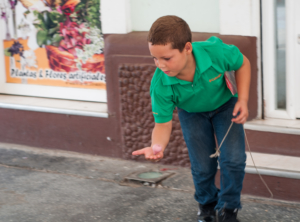Efforts to Help Children Receive An Education in Venezuela

Since 2015, approximately 4 million people have fled Venezuela. For those who have not left the country, food, water and jobs are scarce in the wake of a collapsed economy and hyperinflation. Perhaps the most victimized of the population are children who are unable to find basic access to education in Venezuela.
Why Are Children Not Attending School?
As Venezuelans struggle to afford basic necessities for survival, many children in Venezuela have stopped attending school. For families facing severe hunger, the extra cost of school supplies and uniforms is a price they often cannot afford. Students are unable to perform at school without proper nutrition or clothing. Many parents decide that their children should stay home where they have a chance at a meal.
More than 3 million of the country’s 8 million students have dropped out of school. Some of these students have emigrated with their parents, while others have quit to work and adopt caretaker roles within the family. As Venezuelans face widespread malnutrition, the educational needs of the children in Venezuela remain secondary. It is estimated that 1.1 million children will remain in need of basic education in 2019.
Although education was a hallmark of President Maduro’s campaign, the government can no longer afford to supply schools with proper maintenance and lunches. Public education previously provided a food bonus with a healthy lunch for students. That food program no longer functions, and students cannot rely on meals. In addition, with prices doubling every other month, the transportation system has failed, and both schools and parents struggle to afford bus fares for students.
School Closures without Teachers
Because of low enrollment, hundreds of schools have closed, and thousands of teachers have left their jobs. According to the Venezuelan Teacher’s Association, 176,000 of the country’s 860,000 registered teachers have quit. With wages amounting to about $8 a month, instructors of both private and public schools can no longer afford to work.
Many struggling schools only operate three days a week. Additionally, students from various grade levels are often combined into one class. These schools are desperate to keep the children in Venezuela from dropping out and missing years of formative education under harsh circumstances. Due to the teacher shortage affecting Venezuelan schools, parents are taking on teaching roles, despite a lack of experience or education. Parents believe that any schooling is better than none. As Maria Carmona, a mother-turned-teacher says, “Our children must learn, so I became their teacher.”
Efforts to Help Children Receive An Education in Venezuela
Nonprofit organizations, such as Cuatro Por Venezuela Foundation and Pasión Petare, offer places of refuge and free meals for students. Cuatro Por Venezuela Foundation has provided school supplies for more than 350 families and sent 58,000 pounds of food. Pasión Petare uses soccer to motivate children to stay in school and provides a daily meal for 2,000 students.
Catholic relief organizations like Fe y Alegria and Caritas also raise money to provide food and school supplies. Fe y Alegria provides free education to 170 schools across the country and has implemented a food program for school children. The organization also began a campaign called “A Notebook for Fe Y Alegria,” which raises funds to provide school supplies that most families can no longer afford.
Because President Maduro recently conceded to requests for foreign aid, there are more opportunities for organizations such as the U.N. and Red Cross to offer assistance for Venezuelan schools. UNICEF has partnered with Fe y Alegria and reached more than 100,000 people through radio communication with information on how to help children continue their education. UNICEF and its partner organizations have also provided educational kits for 150,000 children and supply food and water for children in schools. This motivates children and parents to send their children to school.
The Venezuelan government continues to deny problems with their country’s education system. If not for the herculean efforts of international relief organizations, private charities and hands-on assistance from parents and local volunteers, hope would not remain for school children in Venezuela. Children face a bleak future and are vulnerable to exploitation without education. With less than 2 percent of all humanitarian aid allotted to education, it is vital to continue calling for assistance amid the rising crisis. As Susana Raffalli, an advisor to Caritas and renowned nutrition expert, says, “We need our children back in school, because that’s one of the few care and nutrition spaces left.”
– Christina Laucello
Photo: Flickr
